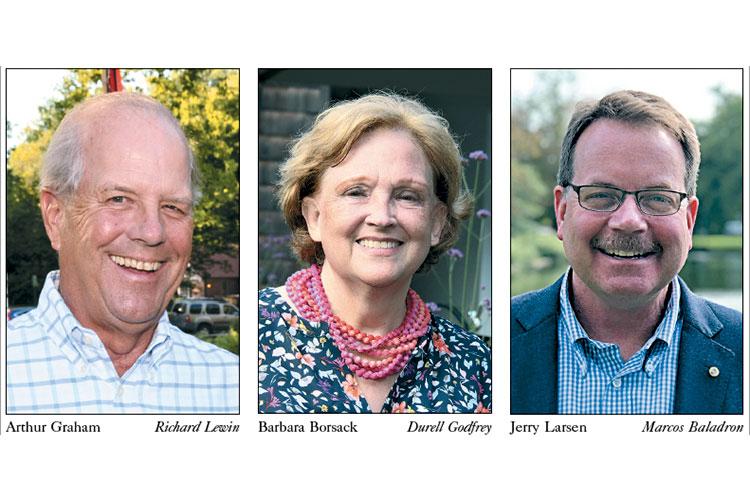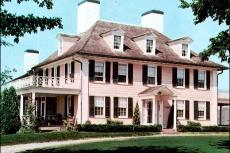The three candidates running for mayor of East Hampton Village on Sept. 15 Barbara Borsack, the deputy mayor, Arthur Graham, a village trustee, and Jerry Larsen, the village's former chief of police discussed their priorities and visions for the village's future in interviews last week.
Ms. Borsack, who in 2000 became the first woman elected to the village board, is hoping to be the first to lead the village as well. As mayor, she said, she would first consider how every proposal would affect residents╒ quality of life. "The residents have to be number one. We have to consider them first, and if it's going to make their lives miserable, then that's not what we want," she said.
Last September, Ms. Borsack and the other members of the village board voted to accept a $110,000 proposal from the Nelson, Pope, and Voorhis civil engineering firm to develop plans to revitalize the commercial district and provide it with a sewage treatment system. Without a system that can handle increased density and reduce the nitrogen that adversely affects ground and surface water, board members say they cannot safely bring in new restaurants and other businesses, nor can they provide more affordable housing by increasing the number of second-story apartments.
"I would love to see more workforce housing in second-story apartments," said Ms. Borsack. "I have kids here, I know how hard it is for them. Teachers and other young professionals need places to stay that they can afford."
While she would welcome more restaurants and coffee shops, she doesn't agree that the commercial core is in immediate need of revitalization. "We have a vital downtown, people are there all the time," she said. "But we have to look toward the future. In 10 years, where are we going to be if people continue to do their shopping online? You always have to project."
In June, after the pandemic forced restaurants to shut down, Village Mayor Richard Lawler issued an executive order letting them set up temporary outdoor dining areas, including on public property. That has allowed restaurants to recoup some lost income, but outdoor dining has not been universally embraced by residents, Ms. Borsack said. "I've had people say to me in passing, 'You know, that is not East Hampton. We don't need people sitting by the cars.' "
Ms. Borsack said the village should continue to allow outdoor dining, but only on a case-by-case basis and only on private property. "I don't think I want outdoor dining on the public right of way, that's problematic," she said.
Two years after adopting a law that prevented the village's historic inns from holding weddings and other special events outdoors, the board is thinking about relaxing the prohibition. Ms. Borsack is willing to allow the inns to hold between six and eight outdoor events per year, but "the residents that live around them would have to be protected," she said. "The inns would have to apply for a special permit so that we can control the music, and the parking, and everything outdoor would have to be over by 9 p.m."
"The inns are nonconforming uses in residential areas, which is what the Surf Lodge was in Montauk. Is that what we want?" she asked, referring to large parties with loud music. "It could very easily happen here if we're not careful."
Earlier this year, the trustees decided to install a mobile enforcement system in village-owned parking lots. The system will allow the police to read license plates and keep track of time restrictions. It will also do away with ticket dispensers, and allow the village to think about how to maximize parking. For example, Ms. Borsack said, "We can try making the outside rim of Reutershan three-hour parking, or the Schenck lot. That's the part that is so exciting, because we can try different things."
Easing traffic congestion is a challenge she welcomes. ╥If we can't get a handle on this traffic, nobody's going to want to be here," she said. She helped form a task force that includes Town Supervisor Peter Van Scoyoc, State Assemblyman Fred W. Thiele Jr., Mayor Kathleen Mulcahy of Sag Harbor, members of the planning and police departments, and residents, who are looking into alternate modes of transportation between the village and the town.
Last summer, Ms. Borsack spent a week in a Maine town that operated open-air trolleys, and she's hoping to develop a similar system here. "If I knew I could walk to the corner and get on a bus within 15 minutes that would take me to the beaches, I would consider it," she said.
Asked what sets her apart from her opponents, she said, "My style is very low-key. I love to work with people and try to problem-solve. I don't fly by the seat of my pants, I'm going to find out as much as I can about a problem, so it might look like I'm not quick to make decisions, but I don't want to be quick to make decisions. I want to know all the facts, and really get as much input as I can from residents. I believe in residents-driven decisions."
Arthur (Tiger) Graham was first elected to the village board in 2017 to serve out the final year of the late Elbert Edwards's term. In 2018, he was re-elected to a four-year term after campaigning as a reformer seeking to update the village's comprehensive plan, renovate Herrick Park, and install a sewage treatment plant. "I am going to, come hell or high water, make sure that we get a sewage treatment plant here in the village," he said at the time.
"I own that issue," said Mr. Graham on Friday. Former Mayor Paul F. Rickenbach Jr. had appointed him to a water quality committee in 2014, and it was then that the idea of a sewage treatment plant was first raised. "Barbara was on that committee with me, and Barbara was a member of the board at the time, and Barbara didn't move forward with waste treatment until 2017, when I was on the board," he said. "I brought it up. Everybody's for waste treatment, but if it wasn't for me, we wouldn't be having the conversation."
To improve the water quality of Hook Pond, Mr. Graham said, the new village board might offer a property tax concession to nearby homeowners who install nitrogen-reducing septic systems.
Addressing ways the village can help businesses thrive, particularly after the financial losses from the pandemic, he said firmly, "The first point is, outdoor dining is here to stay."
In May, Mayor Lawler appointed Mr. Graham chairman of the village's planning and zoning committee, which among other things proposes possible code changes to the village board. The committee has suggested allowing the historic inns to hold 10 events per year, but Mr. Graham said he's personally inclined to allow six during the summer, two per month at least 10 days apart, with one on a weekend and the other on a weekday. The inns would have to apply for a permit, and noise-mitigating measures would have to be in place to protect neighbors, he said,
"The committee is also nearing a recommendation on the outdoor display issue," he said, speaking of a law that prohibits retail stores from displaying outdoor "signs or other advertising structures . . . to attract the attention of the public." Colleen Moeller, for example, who owns the Petit Blue toy store, was cited for violating the ordinance by placing two stuffed golden retrievers, one adorned with a "welcome" sign, at the entrance to her shop.
"What happened to Petit Blue is just not something that should have happened," said Mr. Graham. "We don't want racks of clothing outside, but tasteful displays approved by the Design Review Board I have no problem with."
As mayor, he said, "I will create a committee that regularly meets with the small-business owners the how-are-we-doing thing. What can we do to help you?"
Mr. Graham is also a fan of the mobile parking-enforcement system, and wants to use it to charge nonresidents for an additional hour of parking beyond the initial two free ones currently allowed. "I'm thinking $15 maybe," he said of the cost. Village residents, whose license plates would be detected by the system, would get the third hour free, he said.
For the underused lot on Osborne Lane, Mr. Graham would allow people to purchase a permit to ensure getting a spot there, possibly on an annual basis. "I think there are a fair number of people who work in the village who would pay $100 per month for parking," he said.
He would put a higher priority on improving the village's infrastructure. "A lot of the infrastructure in the village has been ignored," he said, citing the "unplayable" tennis courts in Herrick Park, and an uneven stretch of brick sidewalk in front of St. Luke's Episcopal Church that has been "sprawled by tree roots."
He also wants to add bike lanes to streets that can accommodate them, and make sure the Department of Public Works has the equipment it needs to keep the village well maintained.
Mr. Graham cited his government experience, management capabilities, leadership qualities, and "above all, honesty and integrity," as the qualities that would make him the best choice for mayor, and said he would encourage outside input. "Listening to residents and small-business owners is something I'm adamant about," he said.
Jerry Larsen served on the police force for 34 years, including 14 years as chief, before retiring in 2017. He and his wife, Lisa Larsen, own Protec Security Services, which provides property management and security services for residential and commercial buildings.
Since announcing his candidacy in April 2019, Mr. Larsen has said he is seeking to bring much-needed change and vitality to the village.
"Obviously I want to keep the outdoor dining, I've been talking about that since April 2019, and not one person on the village board had been in favor of it," he said on Friday. "If elected, I would increase outdoor dining on the sidewalks."
To help other businesses, he would create an office of business and tourism as a liaison to the mayor. "I picture this liaison going to all the businesses once a month and asking, how's business going? Has the village screwed anything up that we can help you with?"
He would also hire a consulting firm to review the village's current code to root out outdated restrictions. "And I want to streamline applications for signage and things that are pretty standard, so business owners don't have to go through the Design Review Board," he said. "If you want to put up a new sign and it fits the parameters, then yes, let's just get it approved instead of having to wait a month or two." When asked if the mayor's office was allowed to usurp the D.R.B.'s role, he said, "I think for some things, if we change the code."
Mr. Larsen has also been exploring ways to bring more people to the business district in the off-season. "This winter, I want to put a temporary ice-skating rink in Herrick Park that would encourage families to come into the village." The park would also make a perfect outdoor venue for Guild Hall events, and for the East Hampton Library's Authors Night, he said.
He would allow live music to be played at village restaurants, "so on a cold winter's night there's a band or a piano player playing, and it's a reason to go out and spend money."
"The village board doesn't believe it's their job to help businesses, and I do believe it's our job," he said.
The village has been unaccommodating to organizations like the Hamptons International Film Festival, Mr. Larsen said, in that it has refused to relax parking restrictions. "We hammer [moviegoers] with tickets and it makes no sense," he said. "These organizations do all this work to encourage people to come to the village, and we're not helping. That's been the problem all along."
The sewage treatment plant is a necessity that should have been in the works long ago, he said. "That was first talked about in 2015, and they've just been kicking the can down the road."
In October, Mr. Larsen unveiled a plan to finance a sewer system by charging for parking in the commercial district. He envisions having drivers pay for parking in the village lots and on its streets via a smartphone app. The first two hours would be free, he said, and each additional hour would be about $3 per hour. Together, the ticket machines in the Reutershan and Schenck parking lots typically dispense about one million tickets annually, he estimated. "A million cars at an average of $3, that's $3 million a year."
To maximize the revenue from paid parking, Mr. Larsen said he would increase the number of parking spots, simply by re-striping. He retained Michael King, the owner of Traffic Calmer, a consulting firm, who created 12 new parking spots in Reutershan by converting spaces along its southern end from parallel to angled parking. In the Schenck lot, Mr. King's redrawing of the lines created 14 more spaces, said Mr. Larsen. He also converted the parallel parking spaces on Newtown Lane, from Pleasant Lane to the crosswalk in front of Scoop du Jour, to drive-in parking, which created 47 more spots.
On the subject of permitting the historic inns to hold events, he said, "I've talked to the inns, no one's going to hold a wedding in July or August because the room rates are through the roof and they're already fully booked, so if you're going to have a wedding, chances are it's going to be in the spring or the fall."
He would allow eight events per year, with a maximum of two per month. "I'm not going to tell you, you have to have your event on a Tuesday," he said. "You figure out what you want to do, whatever works best for your business. I totally agree that we have to be sensitive to the neighbors, but there has to be a little give and take here. When they bought their home they knew they were buying next to an inn."
Mr. Larsen would prioritize the maintenance of the village's infrastructure, he said. "The village has let Herrick Park and the Department of Public Works fall into disrepair the D.P.W. has trucks that are 30 years old."
He is the best choice for mayor, he said, "because I've got a lot more leadership experience than anyone else running. When I ran the police department, I had to hire people, fire people, put people on discipline, but I always kept that place together."




